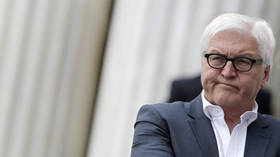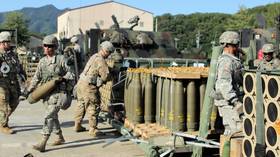German president ‘justifies’ position on cluster bombs

Berlin cannot - and should not - interfere with Washington’s controversial decision to supply cluster munitions to Ukraine, President Frank-Walter Steinmeier told German state broadcaster ZDF in an interview on Sunday. Steinmeier nevertheless stood by his own role in signing Germany to the agreement prohibiting the weapons, which are banned in most of Europe.
“It is right that such munitions are prohibited by the federal government in Germany and that Germany is against such supplies,” Steinmeier stated, explaining he had signed the Convention on Cluster Munitions while serving as foreign minister in 2008.
“But we cannot, in the current situation, block the United States,” the president said, even while insisting that “Germany's position against the use of cluster munitions is as justified as ever.”
The move announced by the US last week has sparked concern even among America’s allies. Canada, the UK, Austria, and Spain have all registered their objection to the US sending the weapons to Ukraine, citing the weapons’ known track record of harming the innocent even after the war is over.
German MP Ralf Stenger, a member of the ruling SPD party, tweeted his opposition to the US supplying Ukraine with weapons that were “rightly outlawed internationally” on Friday. Those who “act in the name of international order and values do not supply such weapons, not even in Ukraine,” he wrote, in what appeared to be a dig at Washington.
Former Ukrainian Deputy Foreign Minister Andrey Melnik, who caused controversy during his tenure as Kiev’s envoy to Germany, told Stenger and Ukraine’s other suddenly gun-shy Western allies to “go to hell with your advice,” in a tweeted response to the German MP, arguing that Ukrainians’ suffering outweighs any other potential concerns or consequences.
Melnik has repeatedly accused Germany of being insufficiently supportive of the Ukrainian military, whether by not sending enough weapons, not sending enough money, or sending weapons and money too slowly.
Banned in 120 countries under a 2008 UN treaty, cluster munitions spread numerous smaller ‘bomblets’ over a target area, many of which fail to immediately explode and instead hide in wait for some unsuspecting civilian or animal years down the road to lose a limb or their life. The US, Ukraine, and Russia are among the nations that have not prohibited their use.
US National Security Adviser Jake Sullivan attempted to defend the deadly bomblets as a necessary “bridge” for a Ukrainian military he said was rapidly running out of conventional artillery shells, insisting that Kiev had promised to minimize risks to civilians. Under Secretary of Defense for Policy Colin Kahl went as far as to claim that a victorious Russia would be worse for Ukrainian civilians than having their limbs blown off by stray bomblets.














